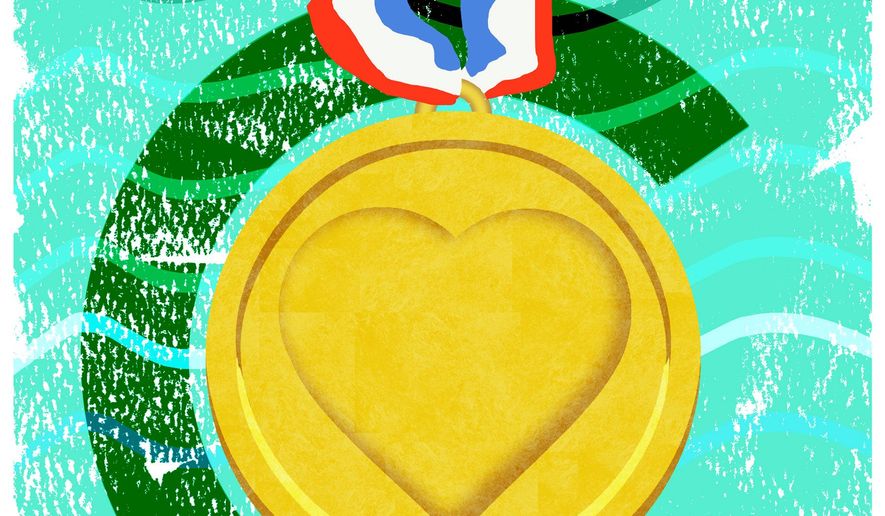OPINION:
A couple of weeks ago, I caught up with Olympic gold medalist Kaitlin Sandeno, who was headed to Budapest to lead the D.C. Trident team in the second season of the International Swimming league. As consequential as the upcoming swimming competitions are for Ms. Sandeno, one of the few female general managers in professional sports, she has been focused to a far greater extent on her sister’s battle with cancer.
This may strike you as a little different from my usual choice of topics to write about, but Ms. Sandeno and I share a mutual understanding and appreciation of what it means to care for a family member undergoing arduous treatment for cancer.
Cancerous cells steal the oxygen and nutrients from other healthy cells. Forming tumors, they harm the patient’s immune system and typically cause weight loss and fatigue. For the patient, her family and friends, cancer is a slow-burn trauma. Adding to the challenge is the medical science, which applies a wide range of treatments but with varying degrees of uncertainty about their effectiveness.
My wife Kim’s oncologist and his team routinely told us there was a such-and-such percentage chance of success to halt the growth or even eliminate some of her cancerous tumors, using chemotherapy, radiation and a series of highly invasive and complicated approaches.
So often with cancer it is as the treatment — as much as the disease itself — which ravages the body and tortures the psyche.
Carved into the wall in the CIA’s Original Headquarters Building lobby is the biblical quotation from John 8:32: “And Ye Shall Know the Truth and the Truth Shall Make You Free.”
For the intelligence community, whose mission is to collect and guard the truth, analytical precision is sacred. Policymakers rely on the CIA and other agencies to shine the spotlight on the greatest threats to our national security, assess the options for dealing with those threats and track how well the responses have achieved the mission.
But over the years, I learned that intelligence analysis is not unlike assembling a jigsaw puzzle — only some of the pieces coming from a different puzzle and others missing altogether. That’s why CIA officers deliver analytical judgments only with levels of low, medium or high confidence.
Intelligence never produces exact certainty. Policymakers must often make life and death decisions with some degree of doubt about the ultimate outcome. President Obama authorized the Navy Seals’ successful Abbottobad raid, even though there was no definitive proof that Osama bin Laden was hiding there.
Swimming results are as objective as anything could possibly be. At the 2004 Summer Olympics in Athens, Ms. Sandeno won silver in the 400-meter individual medley with a time of 4:34.95 and swam the gold medal-winning world record relay leg of the 4x200-meter freestyle with a combined time of 7:53.42.
But swimming fast is as much an art as gathering and interpreting intelligence. Apart from stroke mechanics and strength, nutrition, sleep and positive mental attitude all contribute to better performance. It’s all about the idiosyncrasies of the individual athletes. And that’s why elite competition is particularly enthralling, because no one can predict how each swimmer will perform in any given event on any given day.
Nothing in intelligence or athletics is certain, but most of us — even presidents and Olympic gold medalists — develop a certain comfort level with unpredictability. Like me, many of my generation of CIA colleagues became accustomed to a degree of uncertainty about our careers, especially after 9/11. We took on assignments in the Middle East and South Asia focused on counterterrorism, something we never would have imagined when we entered on duty decades before.
So, when it comes to cancer and its treatment, I learned firsthand that the threshold for uncertainty is infinitesimally small.
But if there is one certainty in life, it is love. Love, as Paul wrote in Corinthians 13:4-8, “does not delight in evil but rejoices with truth. It always protects, always trusts, always hopes, always perseveres.”
And “love does not boast,” because boasting is not a mark of love. Love is focused on the loved one, not oneself. A narcissist who incessantly crows about himself is too focused inward to notice, let alone truly love, anyone else.
Love focuses us outward, on appreciating, nurturing and tending to the loved one’s needs. And there is no greater fulfillment in life, nothing more certain, than caring for the one you love.
• Daniel N. Hoffman is a retired clandestine services officer and former chief of station with the CIA. His combined 30 years of government service included high-level overseas and domestic positions at the CIA. He has been a Fox News contributor since May 2018. Follow him on Twitter @DanielHoffmanDC.




Please read our comment policy before commenting.